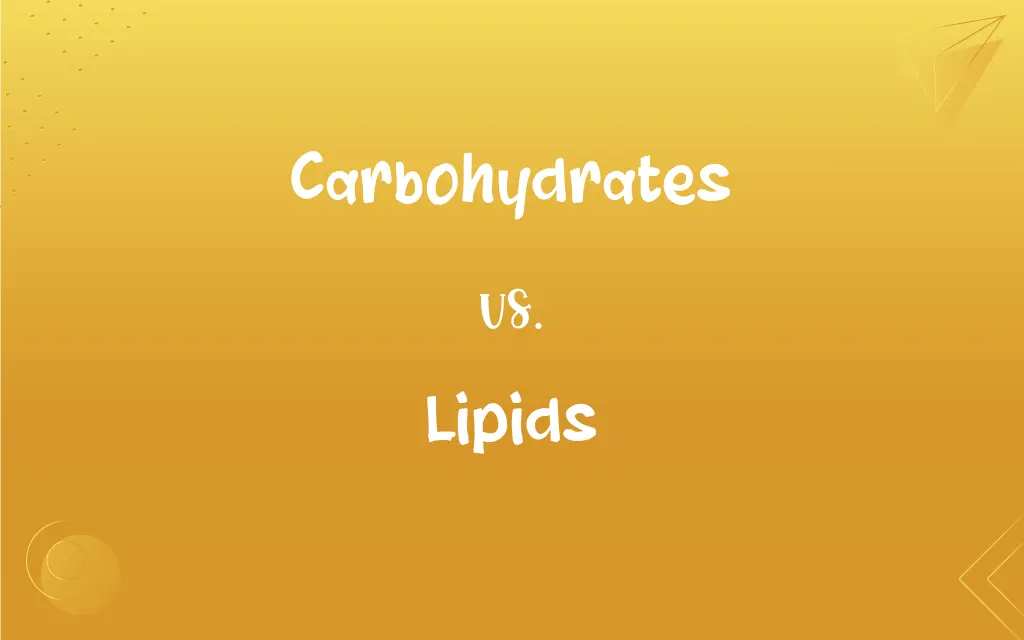Carbohydrates vs. Lipids: What's the Difference?
Edited by Janet White || By Aimie Carlson || Published on November 27, 2023
Carbohydrates are water-soluble sugars and starches for energy and structure; lipids are insoluble fats and oils for energy storage and cell membranes.

Key Differences
Carbohydrates, composed of carbon, hydrogen, and oxygen, are quick energy sources. They include sugars, starches, and fibers found in fruits, grains, vegetables, and milk products. Lipids, also made of carbon, hydrogen, and oxygen, are energy-dense molecules, including fats, oils, waxes, and certain vitamins, found in foods like butter, oils, nuts, and meat.
Carbohydrates are often used by the body for immediate energy and are easily broken down by the digestive system. They play a key role in the functioning of the immune system, fertility, and disease prevention. Lipids, on the other hand, are essential for long-term energy storage, insulation, and protection of vital organs. They also play a crucial role in cell membrane structure and the production of hormones.
Structurally, carbohydrates are polymers made up of monosaccharides like glucose, fructose, and galactose. They can be simple (sugars) or complex (starches and fibers). Lipids, however, are not polymers and are generally not soluble in water. They are made up of fatty acids and glycerol, forming structures like triglycerides, phospholipids, and sterols.
In terms of dietary importance, carbohydrates are key for providing dietary fiber and are significant in diets focused on weight management and diabetes control. Lipids, especially unsaturated fats, are important for brain health, reducing inflammation, and managing blood cholesterol levels.
Carbohydrates have a direct impact on blood sugar levels and are critical in managing glycemic control. They are also the primary source of dietary fiber, which aids digestion and gut health. Lipids are essential for the absorption of fat-soluble vitamins (A, D, E, K) and provide essential fatty acids that the body cannot produce, like omega-3 and omega-6 fatty acids.
ADVERTISEMENT
Comparison Chart
Composition
Carbon, hydrogen, oxygen
Carbon, hydrogen, oxygen
Solubility
Water-soluble
Insoluble in water
Structure
Polymers of monosaccharides
Fatty acids and glycerol
Energy Contribution
Quick energy source
Long-term energy storage
Dietary Role
Immediate energy, fiber
Energy storage, cell structure, hormone production
ADVERTISEMENT
Carbohydrates and Lipids Definitions
Carbohydrates
Primary energy source for the body.
Pasta is rich in carbohydrates for energy.
Lipids
Integral to cell membrane structure.
Lipids are crucial for maintaining cell integrity.
Carbohydrates
Made of sugar molecules like glucose.
Carbohydrates in fruit provide natural sweetness.
Lipids
Aids in absorption of fat-soluble vitamins.
Dietary lipids help absorb vitamins like Vitamin D.
Carbohydrates
Contains indigestible fibers for gut health.
Whole grains are a good source of carbohydrate-based dietary fiber.
Lipids
Stores energy for long-term use.
Lipids in nuts provide sustained energy.
Carbohydrates
Forms part of cell walls in plants.
Carbohydrates in vegetables contribute to their structure.
Lipids
Insulates and protects organs.
Lipids in the body help to keep organs cushioned.
Carbohydrates
Influences blood glucose levels.
Consuming carbohydrates affects blood sugar.
Lipids
Involved in hormone synthesis.
Lipids are important in the production of hormones like estrogen.
Carbohydrates
Any of a group of organic compounds, including sugars, starches, celluloses, and gums, that contain only carbon, hydrogen, and oxygen and that originate chiefly as products of photosynthesis. Carbohydrates serve as a major energy source for living things.
Lipids
Any of a group of organic compounds, including the fats, oils, waxes, sterols, and triglycerides, that are insoluble in water but soluble in nonpolar organic solvents, are oily to the touch, and together with carbohydrates and proteins constitute the principal structural material of living cells.
Carbohydrates
A food, such as bread, rice, or potatoes, that is composed largely of these substances.
Lipids
Plural of lipid
Carbohydrates
Plural of carbohydrate
FAQs
What is the role of lipids in the body?
Lipids store energy, insulate organs, and are part of cell membranes.
What are lipids?
Lipids are fats and oils used for long-term energy storage and cell structure.
What are carbohydrates?
Carbohydrates are sugars and starches used by the body for energy.
How do carbohydrates impact energy levels?
Carbohydrates provide immediate energy and affect blood sugar.
Do carbohydrates contain fiber?
Yes, complex carbohydrates include dietary fiber.
Are carbohydrates water-soluble?
Yes, most carbohydrates are water-soluble.
What are simple carbohydrates?
Simple carbohydrates are quick-digesting sugars like glucose.
Do lipids affect cholesterol?
Yes, certain lipids can influence blood cholesterol levels.
Are all carbohydrates the same?
No, there are simple (sugars) and complex (starches, fibers) carbohydrates.
Are lipids water-soluble?
No, lipids are generally insoluble in water.
What is the structural role of lipids?
Lipids are key in forming cell membranes and hormone production.
Can lipids be used for energy?
Yes, lipids are an important source of stored energy.
What is glycemic index related to carbohydrates?
The glycemic index measures how carbohydrates affect blood glucose.
What types of lipids are there?
Types include triglycerides, phospholipids, and sterols.
Can carbohydrates affect weight?
Yes, carbohydrate intake can impact weight management.
Do lipids provide insulation?
Yes, lipids play a role in insulating and protecting organs.
How do lipids contribute to health?
Lipids provide essential fatty acids and aid in vitamin absorption.
What are essential fatty acids in lipids?
Essential fatty acids, like omega-3, in lipids must be obtained from diet.
How do carbohydrates affect diabetes?
Carbohydrate management is crucial for blood sugar control in diabetes.
Do carbohydrates have a role in plant structure?
Yes, carbohydrates contribute to the structural aspect of plants.
About Author
Written by
Aimie CarlsonAimie Carlson, holding a master's degree in English literature, is a fervent English language enthusiast. She lends her writing talents to Difference Wiki, a prominent website that specializes in comparisons, offering readers insightful analyses that both captivate and inform.
Edited by
Janet WhiteJanet White has been an esteemed writer and blogger for Difference Wiki. Holding a Master's degree in Science and Medical Journalism from the prestigious Boston University, she has consistently demonstrated her expertise and passion for her field. When she's not immersed in her work, Janet relishes her time exercising, delving into a good book, and cherishing moments with friends and family.







































































